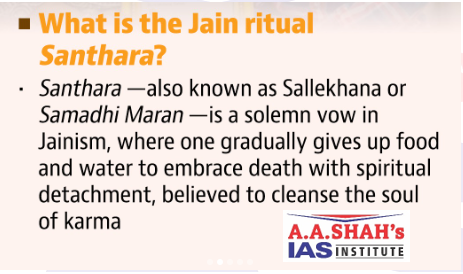Sallekhana or Santhara practice in Jainism
ART & CULTURE – RELIGION
17 OCTOBER 2025
- Sallekhana or Santhara is a religious practice in Jainism that involves voluntarily fasting to death.
- It is undertaken by a person, typically in old age or terminal illness, when they believe that their life has served its purpose and they are spiritually prepared to detach from physical body.
- It is not suicide but a gradual process done with full awareness and consent.
- The aim is liberation from worldly attachments, including the body, desires, and passions
- It is practiced by both Jain monks/nuns and devout laypersons, usually in consultation with a spiritual teacher.
- Only taken when death is imminent or life no longer supports spiritual practice, not as a way to escape worldly problems.
- It is supported in Jain texts like Tattvartha Sutra, which refers to it as a virtuous death.
- Chandragupta Maurya is said to have ended his life by practicing sallekhana.
- According to Jain tradition, he renounced his throne, became a monk under the guidance of the Jain saint Bhadrabahu, and retired to the site of Chandragiri hill, in Shravanabelagola, Karnataka where he passed away after abstaining from food and water.
- In 2015, the Rajasthan High Court ruled Sallekhana illegal, equating it with suicide.
- Later that year, the Supreme Court of India stayed the decision, recognizing the need to balance religious freedom with legal frameworks.
